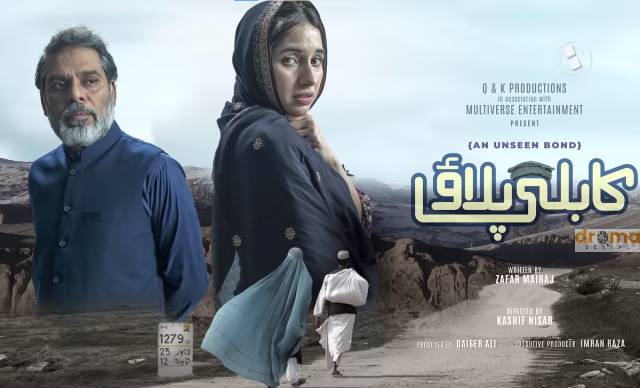“Kabli Pulao” has taken the Pakistani drama scene by storm, pulling in viewership from all around the world and engaging the audience with an unusual love story. While more dramatic shows have acquired this kind of popularity, it’s great to see a well-written, well-enacted, quality show receiving this kind of attention. While the love triangle between Haji Mushtaq, Barbeena and Baraan has left viewers torn in different directions for different reasons, the “Kabli Pulao” finale puts our questions to rest and delivers on a strong note which leaves us satisfied. Starring Mohammed Ehtashamuddin, Sabeena Farooq, Abdullah Farhatullah, Nadia Afgan, Munazzah Arif, Adnan Shah Tipu, Haseeb Khan, Saqib Sameer and others in prominent roles, the story has been written by Zafar Mairaj and directed by Kashif Nisar.
In the finale, Mushtaq (Ehtashamuddin) is on a search for Barbeena (Sabeena Farooq) realizing he made a horrible mistake by allowing her to go. There’s an excellent line here spoken by Baraan (Abdullah Farhatullah), stating that Barbeena is a refugee and is used to moving from place to place with limited supplies at a moments notice, highlighting the plight of those who have been forced from their land. Unfortunately, Mushtaq turns up empty-handed and returns home from Islamabad, losing hope of finding Barbeena. Ironically, Mushtaq’s hope and courage is restored not by family, who continue to focus on what others will say rather than Mushtaq’s dilemma, but rather by Shamim (Nadia Afgan) and Baraan. The moment between Shamim and Mushtaq is beautiful, Shamim displaying just how much she loves Mushtaq by encouraging him to follow his heart and leave his family behind, promising to care for them in his absence. Shamim is a character who has been so misunderstood throughout this drama, but has proved time and time again that she genuinely loved Mushtaq. The shot of the two sitting side by side as childhood companions do is both beautiful and tear-inducing. If there’s anything more we could have wished for, it’s to have seen Shamim find her own happiness away from Mushtaq, which is something she deserved. Nadia Afgan deserves a round of applause for her performance as Shamim, a grey but lovable character.
Baraan, on his end, encourages Mushtaq to find his companion. Baraan is a beautiful character, a man who loved Barbeena deeply and endured his own share of trauma during his years missing. However, his statement makes an impact, saying that he could never have accepted Barbeena as his wife again – because she is Haji Mushtaq’s wife. While he wanted to say a final goodbye to his love, he would never have been able to take her with him with good conscience. Baraan is pure of heart, realizing not only that his ship with Barbeena has sailed, but also recognizing the impurity of the relationship, the confusion associated with it. Abdullah Farhatullah has given his one hundred percent to this role and despite playing a complicated character, he wins our hearts.
Finally, Mushtaq leaves home, giving the business to Baraan to run, which also gives Baraan a purpose. He sets out to live out the life he intended in the beginning, putting it all in Allah’s hands – and, in a beautiful, simple end, Mushtaq finds Barbeena exactly where he first met her. The two reunite over a plate of Kabli pulao, their partnership in the business representing the love and respect the two have in their marriage. And with this, all’s well that ends well, two lonely souls finding happiness and completion in one another.
“Kabli Pulao” has taken us on a beautiful journey of love and acceptance, showing that age is just a number, but along with that, the importance of consent. This has been a love story based on mutual respect and the need of a supportive companion, Barbeena & Mushtaq’s love growing over time. The starts of “Kabli Pulao” are obviously Ehtashamuddin and Sabeena Farooq, who have been exceptional as Mushtaq & Barbeena, two sensitive souls who have seen their share of life and found solace in one another. It’s rare that we see such characters on our screens, immediately lovable yet complicated. And yet, it’s not only the lead performers who are the starts, credit going equally to Zafar Mairaj and Kashif Nisar as the writer-director duo. The magic weaved by this story is due to its heartfelt writing and poetic presentation. “Kabli Pulao” is not only a show that will be sorely missed, but also one that will live on in our hearts and memories for years to come.

